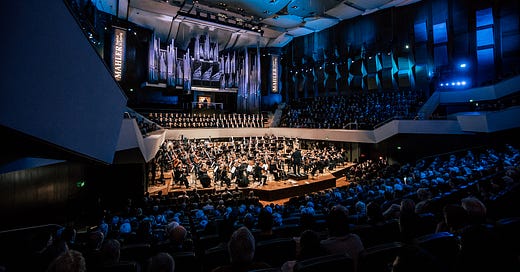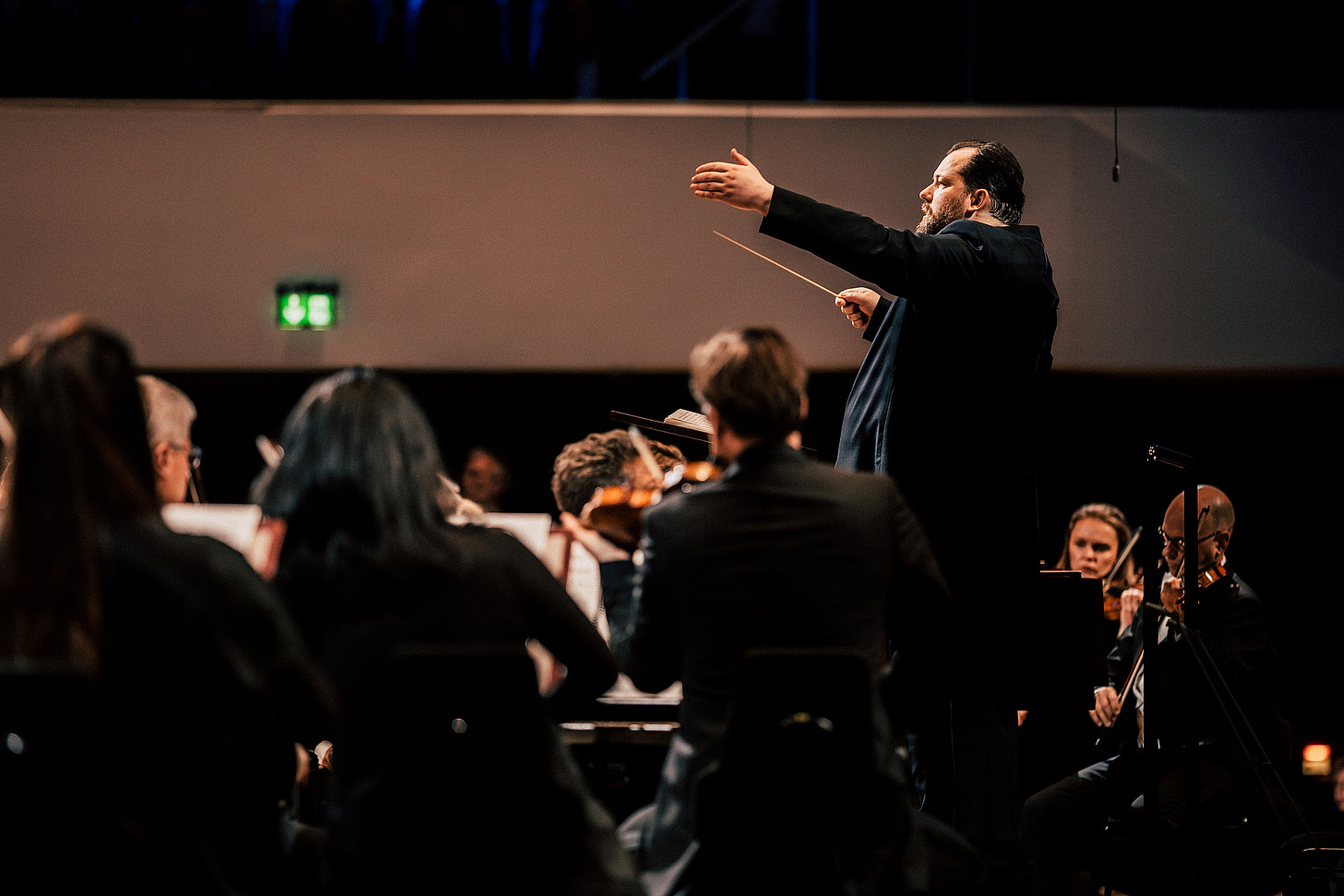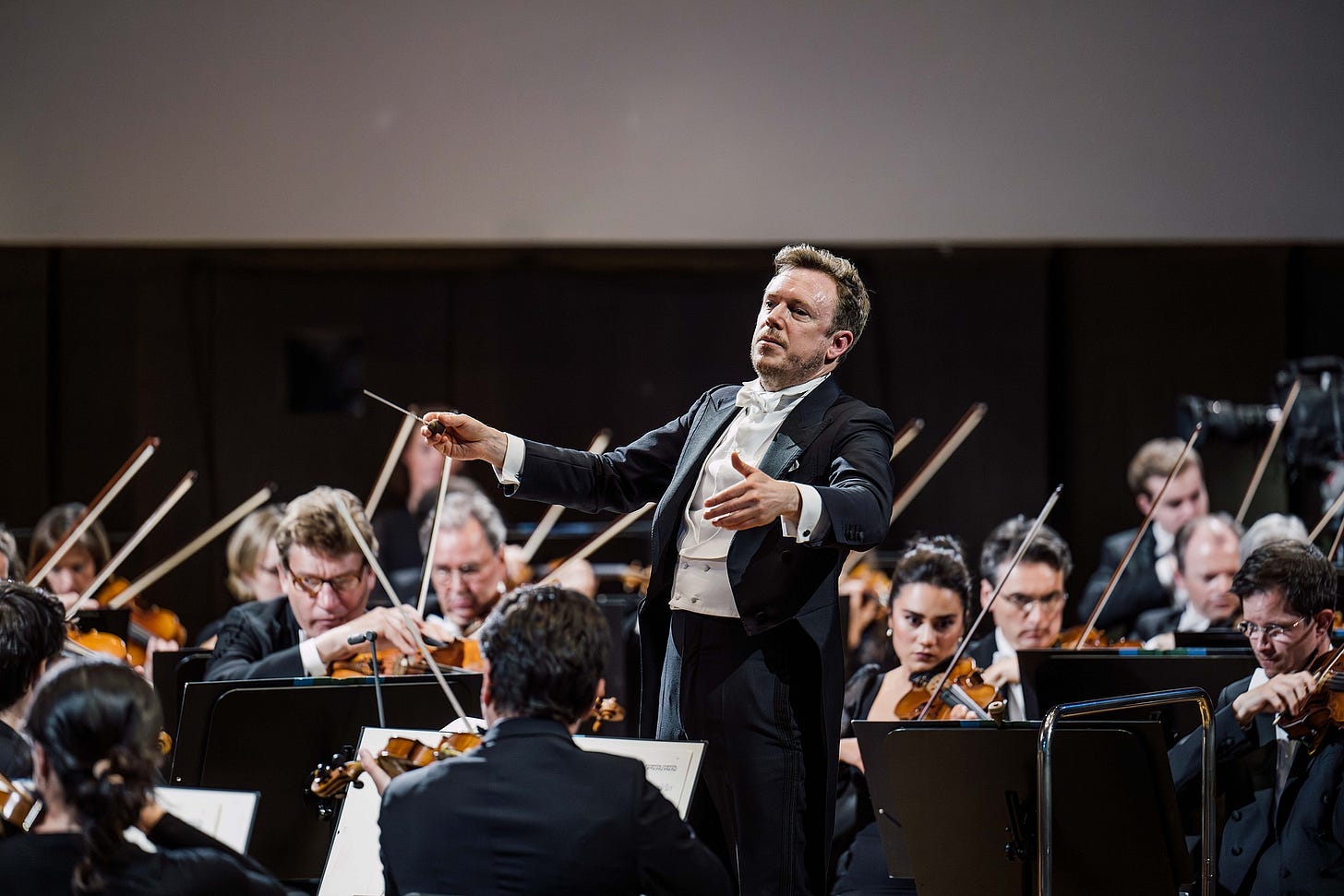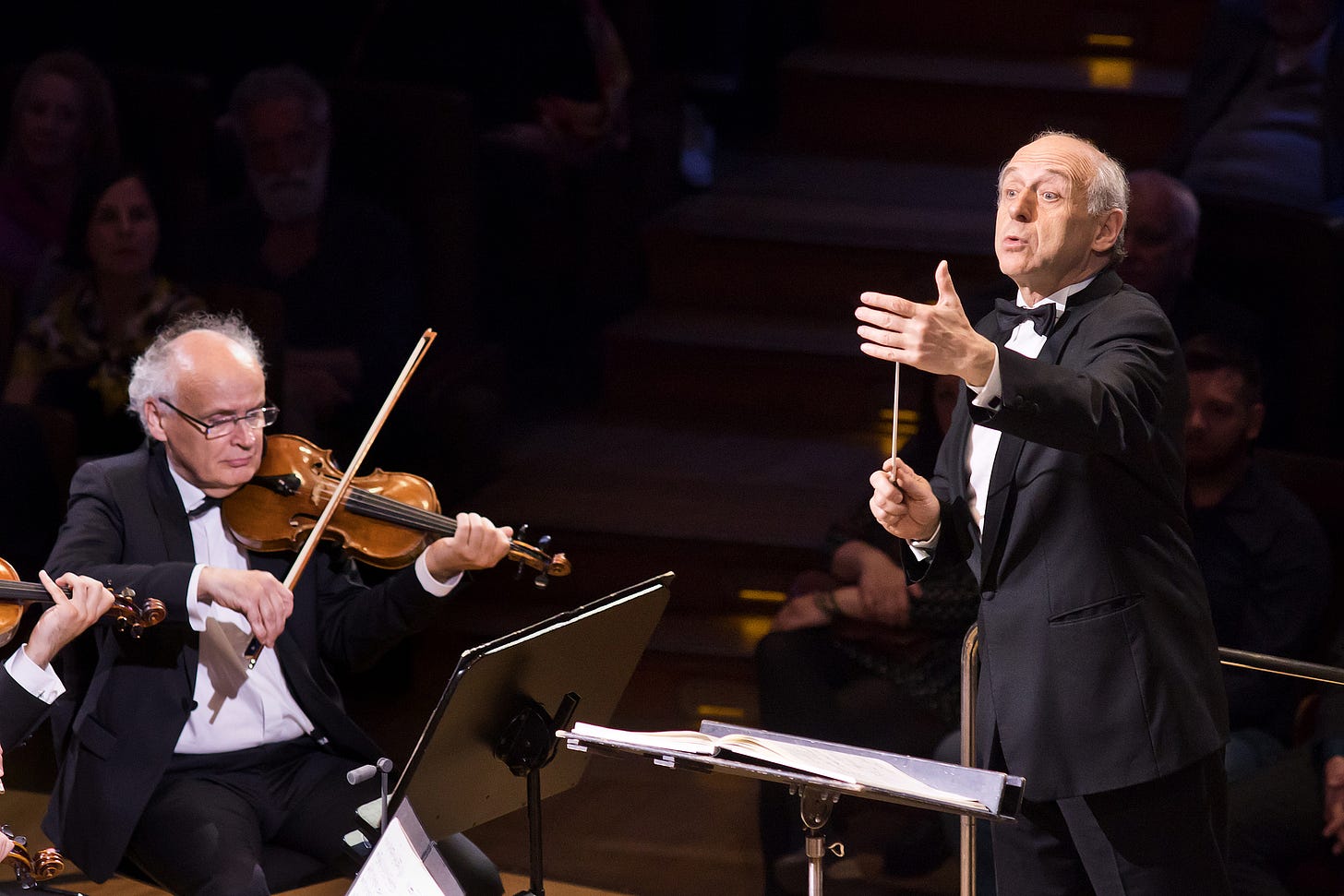Andris Nelsons presides over the massed forces for Mahler’s Resurrection Symphony on Leipzig’s Gewandhaus podium Picture by Gerd Mothes
Leipzig may not be thought of as a festival city comparable to Salzburg, Edinburgh or Aix-en-Provence, but the second city of Saxony (after Dresden) is nevertheless a city of many festivals. The streets of its surviving old town were once walked by Bach, Mendelssohn and Schumann. Wagner was born here - his birthplace marked by a plaque on a ladies fashion shop - and the young Mahler spent a couple of years as a junior Kapellmeister at the city’s Opera House, writing much of his first symphony during his time off from operatic duties.
Celebrations of Bach and Mendelssohn are regular occurrences in Leipzig, and in 2022 the opera house mounted a unique event over two weeks, when all 13 of Wagner’s operas were performed in chronological order, with the historic Leipzig Gewandhaus Orchestra in the pit of the 1960 theatre, built early under the regime of the German Democratic Republic, in a glam-Soviet style which retains a certain period charm.
Facing the opera on the other side of Leipzig’s main square, Augustusplatz, is the Gewandhaus - the third concert hall of that name. The first (1781-1884) was a repurposing of a cloth merchants’ guildhall, famed throughout Europe under the musical direction (1835-47) of Felix Mendelssohn, whose ‘Scottish’ Symphony and Violin Concerto were premiered there in 1842 and 1845 respectively.
Mahler’s connection with the city may have been much briefer, but during his two years there he not only conceived his first symphony but also presented himself as a composer-arranger with the first performance of his only operatic project, a completion of Weber’s comic opera, Die Drei Pintos, unfinished at the composer’s death and premiered in 1888 in Mahler’s realisation (I have encountered this charming fragmentary piece only once in the theatre, an Oxford University Opera Club production in 1976).
Fittingly for the Gewandhausorchester’s 2023 Mahler Festival, this Mahlerian rarity opened proceedings with a concert performance in May. The Festival closed with Mahler’s most operatic original score, his vast ‘Symphony of a Thousand’ (No 8), juxtaposing the Latin Pentecostal Hymn, Veni Creator Spiritus (Come, Spirit of Creation), with the greatest musical setting of the final scene from Goethe’s Faust.
Mahler’s symphonies are, of course, the big beasts of the concert repertoire, and a complete traversal of these works, masterpieces all, makes for ideal festival programming. The Gewandhausorchester numbers among its former music directors, Bruno Walter, the pioneering Mahler interpreter, whose championship of the composer in the city was scuppered by the rise of the Nazis in the 1930s. But amends were made to some extent during the long regime of Kurt Masur (1970-1996). It was Riccardo Chailly (2005-16) who headlined the orchestra’s first Mahler Festival in 2011, and his successor, Andris Nelsons presided over this year’s, postponed from 2021.
Mahlerian drama from Nelsons Picture by Gerd Mothes
Unsurprisingly, Nelsons chose to conduct Mahler’s two largest-scale symphonies, No 2 ‘Resurrection’ and the huge choral No 8. For practical reasons guest orchestras usually can’t bring a chorus with them: the only one that did for the 2023 festival came from nearby Dresden (Symphony No 3, conducted by Christian Thielemann). The remaining symphonies and the orchestral song-cycles were performed by distinguished guests including Tugan Sokhiev and the Munich Philharmonic (No 4, and Song of the Earth), Myung Whun Chung and Amsterdam’s Royal Concertgebouw Orchestra (No 5), Semyon Bychkov and the Czech Philharmonic (No 6) and - for a performance of Deryck Cooke’s completion of the Tenth Symphony - the City of Birmingham Symphony Orchestra under Robert Treviño (a late replacement for Mirga Gražinyté-Tyla).
I attended the festival to catch the CBSO’s performance - which I had missed in the UK - but it was hard luck that it followed on the evening after a matinée performance of the Second Symphony by the Gewandhausorchester under Nelsons. The home team are at a huge advantage, knowing the marvellous acoustics of their own hall inside-out, while Mahler’s ‘Resurrection’ Symphony is one of the composer’s sure-fire hits. Gražinyte’s cancellation was undoubtedly a disappointment, though the Leipzig audience welcomed Treviño and the Birmingham orchestra in a well-played, thoughtful and expansive, if not unforgettable account of the Cooke/Mahler Tenth.
Compared with, say, Simon Rattle, who has persuaded sometimes reluctant orchestras to play the completion of Mahler’s unfinished fragment, Treviño’s performance lacked something in conviction - but this still contentious work will always be at a disadvantage in the context of performances of Mahler’s completed masterpieces.
Daniel Harding coaxing the Bavarian Radio Symphony Orchestra string section Picture by Tom Thiele
The following day brought the Bavarian Radio Symphony Orchestra, Rattle’s new orchestra, under the baton of Daniel Harding, in a noble, fantastical account of the Seventh Symphony. I have to admit I always found this a forbidding work, arguably Mahler’s most avant-garde, in which he seems to flirt with the soon-to-emerge atonality of his young contemporaries Schoenberg, Webern and Berg.
That remained my impression until I heard a revelatory account by the Gustav-Mahler Jugendorchester under Claudio Abbado at the Edinburgh Festival. Harding is an Abbado (and Rattle) disciple: his account of the Seventh shared his mentor’s clarity of thought and cogency, and the Bavarians’ playing almost equalled that of the Gewandhausorchester in No 2.
My final concert was devoted to the valedictory Ninth Symphony with its self-conscious quotation of the ‘Farewell’ motif from Beethoven’s Piano Sonata ‘Les Adieux’. Mahler may well have felt that his world was coming to an end. The symphony’s final movement withdraws into an abyss of despair, then nothingness. This arguably greatest of Mahler’s works was given in Leipzig by the Budapest Festival Orchestra and their founder-conductor Ivan Fischer, whose Mahler interpretations have been enshrined on disc to international acclaim.
Ivan Fischer conducts his Budapest Festival Orchestra in Mahler’s valedictory Ninth Picture by Konrad Stoehr
Hearing it towards the end of a Europe-wide tour, one could marvel at the beauty of the Hungarians’ playing - Budapest, after all, was one of the early stages on Mahler’s conducting career - and at Fischer’s beautifully sustained tempi: the performance lasted 15 minutes longer than his Channel Classics recording.
After the drama of Nelsons’ Second and Harding’s Seventh, this was a meditative farewell reminiscent of the old-school Otto Klemperer’s famous recording, but it was so movingly unfolded that one could not come away unshaken or unstirred. All of Mahler’s symphonies are emotional roller-coasters, which is why his oeuvre makes such gripping festival fare: it was no coincidence that as Leipzig’s tribute drew to a close, Amsterdam’s Royal Concertgebouw Orchestra announced its next Mahler festival for 2025.
Andris Nelsons in Leipzig
September 21/22/24 2023 - Gewandhausorchester, MDR Radio Choir, Christiane Karg, Elsa Benoit, Werner Güra Mendelssohn: Symphony No 5, Symphony-Cantata (No 2) Lobegesang
October 26/27 2023 - Gewandhausorchester, Wagner: Prelude and Isolde’s Liebestod; Bruckner: Symphony No 9
February 15/16/22/23 2024 - Gewandhausorchester, Leonidas Kavakos (violin) Tchaikovsky - The Voyvoda, Hamlet, Symphony No 6 “Pathétique”; Violin Concerto, Symphony No 5 (Two concerts, also touring Europe: Hamburg, Luxembourg, Paris, Amsterdam, Essen, Vienna February 26 - March 10, 2024)
May 7/8 2024 - Gewandhaus-orchester, MDR Radio Choir, Golda Schultz, Patricia Nolz, Piotr Beczala, Bryn Terfel Beethoven: Symphony No 9
May 23/24/26 - Gewandhaus-orchester, Lucas & Arthur Jussen (pianos) Mendelssohn: Symphonies 1 and 4 “Italian”; Concerto for Two Pianos
Other Gewandhausorchester Concerts
December 29/30/31 2023 - Gewandhaus-orchester, Gewandhaus Choir, MDR Radio Choir, Julia Kleiter, Catriona Morison, Maximilian Schmitt, Tareq Nazmi (soloists) Manfred Honeck (conductor) Beethoven: Symphony No 9
April 18/19/21 2024 - Gewandhausorchester, Franz Welser-Möst (conductor) Mahler: Symphony No 5
May 30/31 2024 - Gewandhausorchester, Karen Gomyo (violin), Semyon Bychkov (conductor) Shostakovich: Violin Concerto No 1; Strauss: An Alpine Symphony
Saint John Passion
March 28/29 2024 - Gewandhaus-orchester, St Thomas’s Choir, Elisabeth Breuer, Jakub Józef Orliński, Daniel Johannsen, Benjamin Appl, Tomáš Král (soloists), Andreas Reize (St Thomas Cantor/conductor)
Mendelssohn Festival Days
The week-long event focuses on the chamber works, songs and Bach-promotional activities of the Gewandhaus-orchester 19th C Kapellmeister with a symphonic concert - Melusine Overture and Scottish Symphony sandwiching Schumann’s Piano Concerto (Seong-Jin Cho) - conducted by Nelsons
website: gewandhausorchester.de
I attended the Mahler Festival at the invitation of the Gewandhaus-orchester








Thanks Marina!
Fascinating article, as ever 👏👏